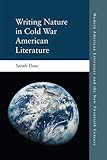Writing nature in Cold War American literature /Sarah Daw.
Material type: TextSeries: Publication details: Edinburgh : Edinburgh University Press, (c)2018.Description: 1 online resource (256 pages)Content type:
TextSeries: Publication details: Edinburgh : Edinburgh University Press, (c)2018.Description: 1 online resource (256 pages)Content type: - text
- computer
- online resource
- 9781474430043
- PN98 .W758 2018
- COPYRIGHT NOT covered - Click this link to request copyright permission: https://lib.ciu.edu/copyright-request-form
| Item type | Current library | Collection | Call number | URL | Status | Date due | Barcode | |
|---|---|---|---|---|---|---|---|---|
 Online Book (LOGIN USING YOUR MY CIU LOGIN AND PASSWORD)
Online Book (LOGIN USING YOUR MY CIU LOGIN AND PASSWORD)
|
G. Allen Fleece Library ONLINE | Non-fiction | PN98.36 (Browse shelf(Opens below)) | Link to resource | Available | on1049974770 |
Browsing G. Allen Fleece Library shelves, Shelving location: ONLINE, Collection: Non-fiction Close shelf browser (Hides shelf browser)
Includes bibliographies and index.
Introduction : ecocriticism and the mid-twentieth century -- Attaining fana in Paul Bowles's infinite landscapes -- Nature and the nuclear Southwest : Peggy Pond Church and J. Robert Oppenheimer -- The influence of Chinese and Japanese literature on J.D. Salinger's philosophy of nature -- The Beat ecologies of Allen Ginsberg and Jack Kerouac -- Bifurcated nature in Mary McCarthy's Birds of America -- Conclusion : 'know that the earth will madonna the Bomb'.
"Compelling analyses of the function and representation of Nature in a wide range of Cold War fiction and poetry by authors including Paul Bowles, J. D. Salinger, Jack Kerouac, Allen Ginsberg and Mary McCarthy reveals the prevalence of portrayals of Nature as an infinite, interdependent system in American literature written between 1945 and 1971. Daw astutely highlights the Cold War's often overlooked role in environmental history and argues that Rachel Carson's Silent Spring (1962) can be considered as part of a trend of increasingly ecological depictions of Nature in literature written after 1945. By exploring the most recent developments in the field of ecocriticism, the book is embedded within current ecocritical debates concerning the Anthropocene and anthropogenic climate change." --
COPYRIGHT NOT covered - Click this link to request copyright permission:
There are no comments on this title.







